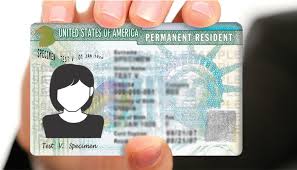Immigration News & Updates eNewsletter
eNewsletter
POSTING DATE: June 5, 2017
Learn More About:
Immigration News & Updates eNewsletter © 2011 - 2017
For questions about U.S. Residency, Green Cards and Immigration Visas, Visit our Website at: www.ImmigrateToday.com or call our office at: (954) 382-5378
Check Out This Cool Stuff For Immigrants....
Immigration
Questions & Answers
This Week's Immigration News
Question: I brought my daughter to America when I came here on vacation visiting my family in Florida many years ago when she was 2 years old and I never left. She will turn age 15 this month and we were hoping that your office could apply for her under the DACA program, but were told by some friends that the courts have cancelled president Obama’s program. I just want to confirm this with you, thank so much for your help
Answer: That’s a great question. There are two DACA programs, one, begun in 2012, which required children to have entered the U.S. before age 16, on or by June 15, 2007, and capped the age of the applicant to 30 and the new DACA program under the President’s Executive Actions, which was scheduled to begin in February 2015 (now temporarily suspended by a Federal Court), which extended the date a child entered the U.S. before age 16 to on or before January 1, 2010 and removed the cap on age. The 2012 DACA is still in effect and has not been suspended. Therefore, children qualifying under its requirements are eligible to apply for DACA status once they reach age 15. Since your daughter came to the U.S. at age 2 (before age 16) and has been in the U.S. since before June 15, 2012, we can apply for her DACA status as soon as she turns age 15 later this month.
Helpful Immigration Hints You Can Use
Immigration How To:
How Do I Know Whether My Child Will Get Citizenship Along With Me?
Tips On Renewing or Replacing Your Green Card
U.S. Permanent Residents receive a 10-year Green Card, which must be renewed before expiration. The renewal request should be filed with the USCIS within 6 months of expiration.
However, contrary to popular belief, the expiration of your Green Card does not mean that you are no longer a Permanent Resident, it just means that, once the card expires, you will no longer have documentary evidence that you are a U.S. Resident. Those applying for Naturalization must either have an unexpired Green Card, or receipt showing that a renewal application has been filed.
Once the Green Card is within 6 months of expiration or even when it has actually expired, in order to obtain evidence of Residency, a Permanent Resident must file a renewal request, then make an INFOPASS appointment at your local USCIS Field Office and take the Green Card renewal receipt provided to you by mail from the USCIS in order to obtain a temporary residency stamp in your passport. This temporary residency stamp is used as a temporary Green Card until the renewed Green Card is received. It can be used to work, travel, obtain Driver’s License renewal and any other purpose that an actual Green Card would serve.
Stay Informed - Sign-up For USCIS E-Notification & Email Updates On Your Immigration Case
For instance, once your Immigration application is filed, the USCIS may issue you a letter requesting more evidence in order to continue processing the case. If you are registered to receive case status updates, you will receive an email notification that the USCIS has issued the request, which helps you to be aware that you should be receiving the request by mail soon. If you have not received the request, you can then make further inquiries. Similarly, once you respond to the USCIS request, you will receive an updated email notification that they have received your documentation. It’s a great way to stay informed and keep up to date on the status of your case as it is being processed.
To request e-notification, download and complete form G-1145 and mail along with all Immigration applications.
Once you receive your case number, go to the USCIS website and sign up for Email Status updates on your case through the USCIS My Case Status program. Once you register and enter your case number(s), the USICS will automatically email you notifications and updates on any actions take on your case so that you are better informed about your case status.
Question: I came to Florida with my young son to visit my brother and his family back about 20 years and was offered a good job so I stayed here. My son grew up and later married an American and got his Green Card. He just became an American Citizen earlier this year, joined the military and is in boot camp right now. I’d like to know if you can file for my green card even though my status expired all those years ago and if so, will it be a problem that my son lives in another state for his military training and I live here in Florida? Do I need to live with my son to be able to get my green card?
Answer: Not to worry, under Immigration regulations, Parents/Spouses and Minor children of U.S. Citizens are “Immediate Relatives” and as long as they entered the U.S. legally (meaning being inspected by an immigration officer), then even if the I-94 period of stay expires and they become “out of legal status”, they can still obtain U.S. Residency through their U.S. citizen child (age 21 or older). Since you live in Florida, we would be filing your petition using your Florida address. Parents are not required to live at the same address or even the same state as their sponsoring children. However, if you are scheduled for a residency interview, your son should travel to Florida to accompany you. The USCIS has begun waiving Interviews for many parents, although not in all cases.
Affidavits of Support Are Not Required For Certain Minor Children of U.S. Citizens
Did you know that the children of a U.S. Citizen parent who are under age 18 at the time of immigrating, are not required to have an Affidavit of Support filed on their behalf? Its true. Eligible children under age 18 who become U.S. Residents (Green Card holders) and by operation of law, automatically become U.S. Citizens, are not required to have an Affidavit of Support filed on their behalf.
This is true for children immigrating from abroad through a U.S. Consulate, as well as children adjusting status to U.S. Residency inside the U.S. through a U.S. Citizen biological parent.
In these cases, the U.S. Citizen parent must file form I-864W, Intending Immigrant's Affidavit of Support Exemption, instead of form I-864 Affidavit of Support.
Find out more about Affidavits of Support and exemptions
by calling our office at: (954) 382-5378
Understanding The Child Citizenship Act of 2000
Under the Child Citizenship Act of 2000, U.S. Resident children who are under age 18 automatically obtain U.S. Citizenship when a biological parent Naturalizes. Similarly, children of U.S. Citizens who immigrate to the U.S. from abroad and enter the U.S. before turning age 18, become automatic U.S. Citizens as well. Qualifying children must be under age 18 at the time their parent actually naturalizes (takes the Oath), not the date the parent files for Naturalization.
However, in reality, none is required, since applying for a U.S. Passport is all that is necessary to prove the child’s new U.S. Citizenship status. In such cases, in addition to other information, the U.S. Passport office requires a copy of the parents’ Naturalization Certificate in order to demonstrate the child’s eligibility as a U.S. Citizen to obtain a U.S. Passport.
As a result, parents should carefully plan the date of filing for Naturalization to ensure that they will complete the process before their child(ren) reach age 18. Figuring 5 months to take into account any USCIS processing delays is reasonable, although most naturalization cases are completed within 4 months or so. Importantly, even when children become U.S. Citizens through this process, the USCIS does not automatically issue a Naturalization Certificate.
The USCIS now offers several ways for Applicants to get updates on newly filed and pending Immigration cases. Immigrants and Sponsors filing Immigration applications with the USCIS can now sign-up to receive text messages and email E-notifications confirming application receipt by the USCIS, along with the case receipt number(s).
The receipt number allows individuals to track the status of their case online. E-notifications are issued within 24 hours after the USCIS receives the application.
Trump Administration Launches New U.S. Visa Questionnaire
For “Social Media” Vetting
The already rigorous process of applying for a U.S. Visa just got more laborious for some foreign nationals seeking to visit the United States. Under a new Trump policy, Consular officers can request some visa applicants to complete an additional questionnaire (new Form DS-5535, Supplemental Questions for Visa Applicants) which among other things, requests applicants to list an extensive 15 year personal history including work, travel and employment, as well as to list their social media information and email addresses for the past five years.
And while its estimated that likely only 0.5 percent of travelers (roughly 65,000 people annually) will be selected for further scrutiny, many experts believe it to be a “backdoor” travel ban, which is aimed at Muslims and will be requested for many nationals of Trumps failed travel ban list, Sudan, Syria, Iran, Libya, Somalia and Yemen. State Department officials say in order to carry out Trump’s goal of “extreme vetting”, Consular officers are authorized to request this additional voluntary information, when they believe “that such information is required to confirm identity or conduct more rigorous national security vetting,”. However, while completing the form is voluntary, applicants who refuse to provide the information will likely have their visa applications denied.
The new form expires November 30, 2017, which could mean that the additional questionnaire will only be used until that time, or more likely that it may simply be updated and revised for future use after that date and may be expanded to be requested from more categories of visa applicants.
Here’s what’s included on the new questionnaire:
All social media handle used during the past five years.
Phone numbers and email addresses used over the past five years
Fifteen years of travel history, with detail on the sources of funding for your travel.
Fifteen years of address and employment history
Details on all passport numbers held, along with country of issuance
Names and dates of birth for all siblings and children
Names and dates of births of all current and former spouses
Proponents of additional vetting measures argue that it’s a step in the right direction to protect Americans, while others argue that it will be difficult for innocent travelers put on the spot to struggle to remember every trip they have taken in the past 15 years, social media site they have registered for and every email they have used in the past 5 years, which could result in denials for innocent omissions. Opponents further point out that
requesting more information will inevitably increase consular waiting times and cause visa processing delays.
The new form will have little or no effect for most visa applicants at this time, but could signal a foreshadowing of more “invasive” things to come. Many visitors to the U.S. have no idea that U.S. Customs and Border Patrol already has the authority to request to inspect electronic devices such as cell phones, ipads and computers for messages, chats and social media and can refuse entry to travelers who refuse to provide passwords and other information. So it may only be a matter of time before it becomes routine procedures to submit to “social media” searches when requesting a visa and entry into the U.S. and be ready to have officers reviewing your Facebook, tweets, chats photos and other social media posts. Stay tuned…












